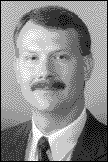From the Executive Director
Pigs and people: The personal touch
 Chicago’s O’Hare Airport was definitely not where I wanted be at midnight on a stormy Tuesday evening. I was trying to return home
from Washington, DC, following a long day of meetings. After two cancelled flights and
4 hours of delays, my flight finally arrived in Chicago. Unfortunately, my connection
to Des Moines had already left and there were no more flights out that night. I was
facing the choice of staying at the airport or
finding a nearby hotel on a night when thousands of travelers were already stuck
in Chicago due to the bad weather. You may know the feeling: tired, disgusted,
and cursing the airlines.
Chicago’s O’Hare Airport was definitely not where I wanted be at midnight on a stormy Tuesday evening. I was trying to return home
from Washington, DC, following a long day of meetings. After two cancelled flights and
4 hours of delays, my flight finally arrived in Chicago. Unfortunately, my connection
to Des Moines had already left and there were no more flights out that night. I was
facing the choice of staying at the airport or
finding a nearby hotel on a night when thousands of travelers were already stuck
in Chicago due to the bad weather. You may know the feeling: tired, disgusted,
and cursing the airlines.
Dragging myself to the nearest gate desk, I inquired about a morning flight to Des Moines. The agent immediately apologized for my flight problems. She quickly booked me on a morning flight and offered me a hotel voucher for the night’s stay. She then called the hotel to ensure that a room would be waiting for me. Despite my foul mood, I could not help but appreciate her attitude towards helping me. She was a bright spot in an otherwise long and frustrating night. Her personal touch made a difference.
Earlier on that same trip, I was engaged in a wide-ranging conversation with a fellow swine veterinarian about why some farms are able to consistently produce higher numbers of pigs per sow. He came to the conclusion that "It’s the people." I agree that pork production is a prime example of the importance of the personal touch.
Most, if not all, swine welfare experts and scientists agree that the caretaker is the most critical determinant of the welfare of the pigs. The pig is the direct beneficiary of the skill and ability of the caretaker. As veterinarians, we have all seen this in practical applications on the farms we serve. Time and time again, the value of positive human-to-pig interaction has been proved in the areas of breeding, gestation, and farrowing. It comes into play in the nursery and all the way out the door of the finishing barn.
People make a difference in pork production in a number of ways through their attitudes and abilities. All the technology in the world is worthless without proper implementation by the people using it on the farm. The difficulty often comes when you try to measure or capture the impact of the personal touch on a farm. It is not an engineering standard or an audit form that ensures that the pigs are being taken care of every day. It is the people who care for the pigs, who are in tune with their needs, and who take responsibility for the pigs’ health and well-being. Without the personal touch, there can be no standards or guidelines that will guarantee the welfare of the pigs on a farm.
For years, swine veterinarians have been dedicated to the personal touch for pigs. We must continue to advocate for that critical part of pig health and well-being. As production systems get larger, it is a common perception that the personal touch is diluted over greater numbers of pigs. Whether this perception is accurate or not, veterinarians must be committed to seeing that the personal touch remains a priority in every situation, regardless of how many pigs are on a farm. Production efficiency can be enhanced through the personal touch.
Veterinarians are in a unique circumstance due to our on-farm experience. The message of the personal touch in pork production needs to be told. Too often, those outside the industry see pork production as consisting only of the hardware, such as buildings, pens, and stalls. This lack of acknowledgement of the vital role played by people makes it easier to criticize and attack the industry. Unfortunately, these attacks often distract us from what really matters on the farm: the pig.
Veterinarians know the fundamental value of people in the care and raising of pigs. We can rise above the challenges that are aimed at banning a specific type of housing or production tool, but only if we can bring the focus back to the personal touch in pork production. It’s the people who make a difference for the pig.
–Tom Burkgren